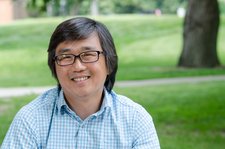
Rich Lee
University of Minnesota
Cultural and Ethnic Minority Psychology
Dr. Rich Lee is a professor at the University of Minnesota. He specializes in counseling psychology, cultural and ethnic minority psychology, and international adoption. His research focuses on aspects of culture, ethnicity, and race that function as risk or protective factors for well-being, mental health, and achievement.
What drew you to the field of psychology and your current research interests?
After college, I realized I needed to do something more than just working at any given job. I thought about all sorts of careers including non-profit foundations, social work, philosophy, theology, law school, and education. In the end, I realized I was most interested in doing something that helped Asian American families and communities.
My current research is threefold. I seek to advance theory and measurement of culture-specific constructs, including ethnic identity, perceived discrimination, intergenerational family conflict, cultural socialization and more. I also am very interested in the unique ethnic and racial upbringing of transracially and transnationally adopted Korean American youth and their families. And more recently, I have begun to engage in clinical translation research with a specific focus on developing and tailoring evidence-based preventive interventions for Asian Americans.
A doctoral degree in psychology can lead to a number of different careers. Can you tell us about how you chose your current career path?
I loved my program (VCU Counseling Psychology) and got along really well with my advisor (Steven Robbins). But I did not attend a graduate program with any faculty interested in ethnic and racial diversity. So instead, I had to read about multicultural psychology and specifically Asian American psychology on my own. At the end of my first year of graduate school, I happened to learn about AAPA and attended my first AAPA conference in Washington DC. It was there that I met the likes of Stan and Derald Sue, Nolan Zane, Yosh Kawahara, Gordon N Hall, Christine Iijima Hall, Reiko True and all the UCLA graduate students working with Stan including Sumie Okazaki, Jennifer Abe Kim, Phillip Akutsu, and Kevin Chun. Even though I was the only non-Chinese/Japanese person in attendance (actually, there was one other Korean American graduate student), they welcomed me and I knew I had found a home. In their own ways, they all mentored me and served as role models.
As you think back to your undergraduate days, what were some experiences that were helpful in bringing you to where you are today?
When I was in high school, I took a general psychology course that was interesting enough. However, it was really my interactions with a high school guidance that piqued my interest in the profession, as I really enjoyed our conversations. Then in my freshman year of college, I took an introductory psychology course that I really enjoyed, partly because of the way the instructor connected theory and research to real life stories. But to be honest, even though I majored in psychology, it was just a major. I had no real ambition to go much further with it. It helped a lot that my undergraduate advisor was Dr. Ramsay Liem (Boston College) who was probably one of the first, if not the first, Korean American psychology professors in the country. Ramsay was a true community organizer/activist and he showed by example what psychologists could do to make an impact on the field. So I decided to pursue counseling psychology with the goal to engage in research that addresses the unique racial and ethnic experiences of Asian Americans.
How do you think we can get more Asian Americans interested in psychology, starting at the undergraduate level?
We need more Asian American faculty! They don’t all have to engage in Asian American psychology research but it would help a lot if they at least knew about Asian American psychology as a research field. It also will be important for faculty to offer courses related to Asian American psychology or broader topics such as cultural psychology, ethnic minority mental health, etc.
What advice would you give any undergraduates who are thinking about majoring in psychology, or pursuing graduate school in psychology?
Pursue your passions and then fully commit to it. If you have not yet identified a passion or are unable to pursue it, then just pick something that interests you enough. Once you have this interest or passion, then you need to consciously persist, push yourself to your limits, take leaps and risks, and savor the moments when you realize you are doing what you love.
